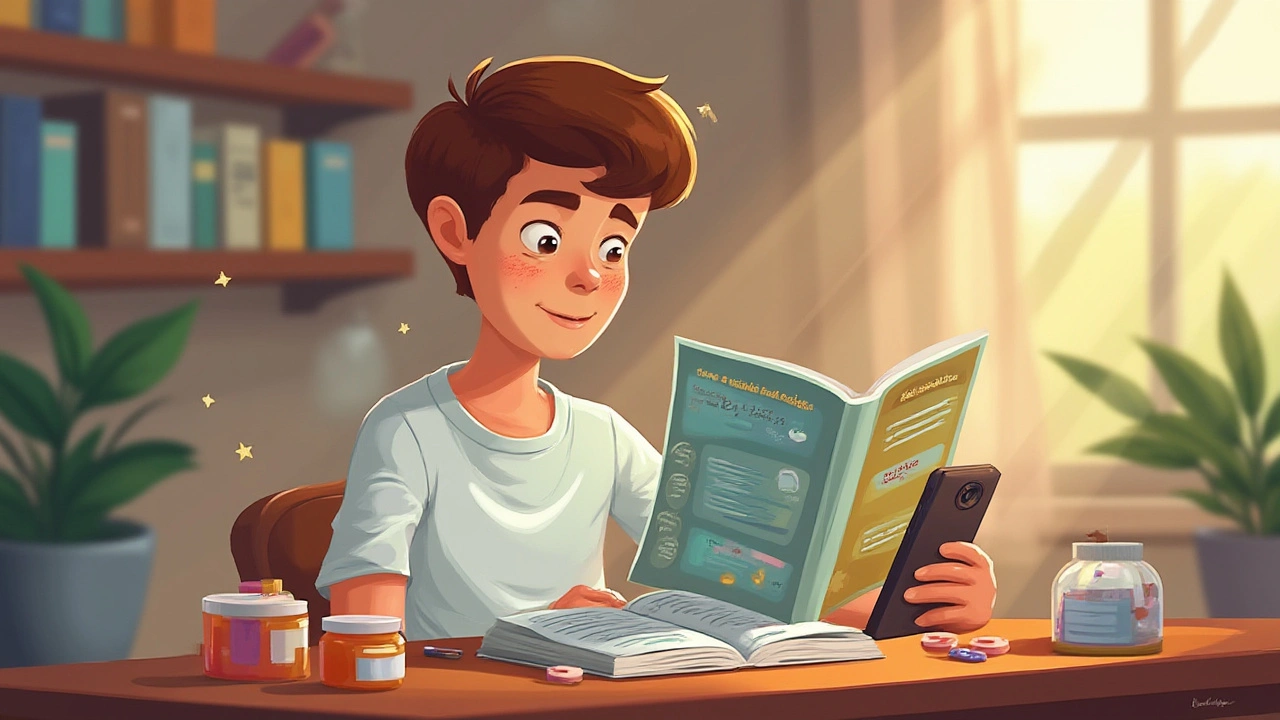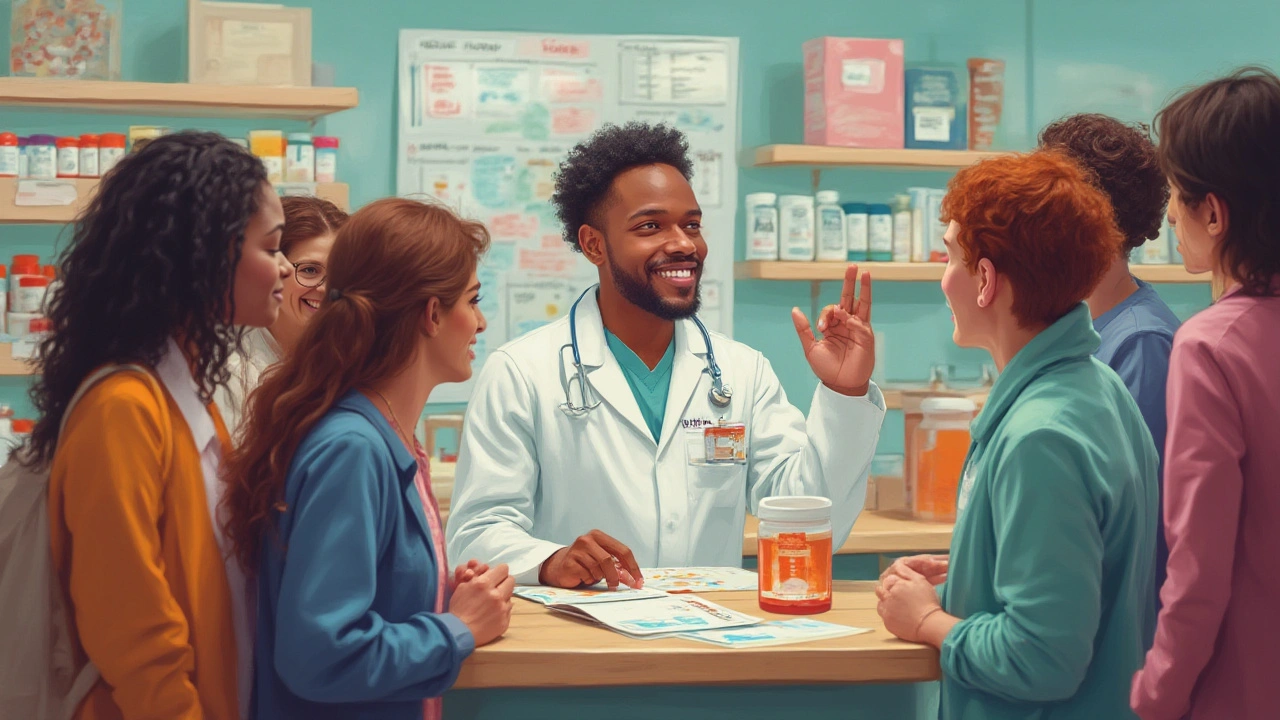Ever stared at a prescription label or overheard pharmacy staff and felt like you landed in a different universe? Drug terms can feel like they’re straight from a secret codebook, only doctors and pharmacists got the memo. Sometimes, not knowing the lingo can make you feel lost or even anxious about taking care of your health. So let's throw open the doors of that mysterious ‘pharmacy dictionary’ and turn cryptic jargon into real talk you can use.
Why Pharmacy Terms Matter in Real Life
Think back to the last time you grabbed a prescription at the drugstore. All those unfamiliar words—generic name, dosage, contraindications—might have zipped right past you. But these terms aren’t just there to sound official. Each one packs a punch, affecting how you take your meds, what side effects you might watch for, and what to ask your pharmacist about. If you misread those oddball words or mix them up, it could seriously mess with your treatment. Did you know that about 1 in 3 people admit they sometimes don't really understand the instructions on their prescription? That’s a big deal because mistakes with medication can lead to unnecessary trips to the ER. The more you know, the less you risk.
Understanding the common lingo gives you the power to manage your own health. Whether it's figuring out what “PRN” means (spoiler: it’s not a new superhero, it just means ‘take as needed’), or spotting that ‘q12h’ stands for ‘every twelve hours,’ cracking the code keeps you in the driver’s seat. A lot of states, including Michigan, now post online glossaries for patients—but let’s make your own cheat sheet right here.
The Essentials: Most-Used Pharmacy Words Broken Down Simple
Some pharmacy words pop up all the time. Here’s a rundown of the ones you’re most likely to see, along with straight-up explanations in plain English:
- Active Ingredient: This is the main part of the drug that actually makes it work.
- Generic Drug: The ‘store-brand’ version of a medicine. Works the same as the fancy name-brand stuff—and usually costs less.
- Brand Name: The official name given by the company that first made the drug. It’s kind of like a sneaker brand versus off-brand.
- Dosage: How much medicine you need to take. This could be one pill, half a pill, five milliliters—whatever your prescription says.
- Contraindication: A reason you shouldn’t take a certain drug. Like, if you’re allergic or have some health condition that clashes.
- Side Effect: The not-so-fun things a drug might do to you besides fixing what’s wrong. Like feeling sleepy or getting an upset stomach.
- Interactions: Some drugs don’t play nice together. If you mix them, weird or dangerous things can happen. This also covers food and drink, not just meds.
- Prescription: Written instructions from a health pro for a specific medicine you can’t just buy off the shelf.
- Over-the-counter (OTC): Stuff you can grab right from the shelves—think Tylenol, antacids, or allergy meds.
- Refill: More of the same prescription without a new doctor’s note.
- PRN: Means ‘take as needed,’ not all the time.
- BID / TID / QID: How often to take it. BID = twice a day, TID = three times, QID = four.
- QHS: Take at bedtime.
These are just scratching the surface, but you get the idea. Don’t let three-letter codes or fake-sounding names trip you up. They all have real meaning that helps keep you safe.
Quick-Reference Table: Pharmacy Terms and What They Actually Mean
| Term | What It Means |
|---|---|
| Active Ingredient | Main chemical doing the job |
| Generic Drug | Same formula as brand-name, cheaper |
| Brand Name | Original company's name for the drug |
| Contraindication | Reason not to use this medicine |
| Side Effect | Unexpected stuff the drug can do to you |
| OTC (Over-the-Counter) | You can buy without a prescription |
| Rx | Prescription-only medicine |
| PRN | Take when you need it |
| BID / TID / QID | How often you take it: 2x, 3x, 4x daily |
| q12h, q8h | Every 12 hours, every 8 hours |
| QHS | Take at night |
| Refill | Permission to get more after you run out |
| Pill vs. Tablet vs. Capsule | Just shapes: pills and tablets are hard, capsules have a shell |
If you have a prescription on hand, check out the names and notes. You’ll spot plenty of these terms right on the bag or bottle.

Why Generic Isn’t a Dirty Word: Unpacking Brand vs. Generic Drugs
Here’s where it gets interesting. A lot of folks think generic drugs are lesser knock-offs, sort of like comparing Detroit’s best homemade pizza to something frozen from a gas station. But the truth is, generics in the U.S. are required by law to have the exact same active ingredients as the big-name stuff. The FDA checks all this, and all approved generics are tested for safety and work the same as brands. The only thing that might change is the look, flavor, or filler ingredients (like what holds the pill together), and that doesn’t mess with the way it fights your illness.
Each year, switching to generics saves Americans billions of dollars. Take statins for cholesterol—it’s one of the most prescribed categories in the country, and about 90% of all statin scripts filled in the U.S. are for the generic versions. Even insurance companies will nudge you toward generics once your doctor says it’s okay, because the price is way lower. If your pharmacist suggests the generic, they’re not trying to short-change your health; they’re saving your cash. If you ever feel weird about a switch, just ask your pharmacist to walk you through what’s different. Nine times out of ten, the answer is simply “the label.”
Tips for Decoding Your Prescription and Getting the Most Out of Your Pharmacy Visit
If you want to avoid confusion or slip-ups, here are some tricks:
- Don’t rush the drop-off or pick-up. Ask questions, even if you feel silly. Pharmacists expect it—they want you to be safe.
- Snap a pic of your label, or keep a small notebook of meds and dosages. If you go to the ER, they’ll love you for it.
- Check warnings. If a label says “take with food” or “avoid sunlight,” there’s a real reason. Don’t skip that stuff.
- Use apps that track when to take your pills. A lot of big pharmacy chains have reminders and info built in.
- If you spot a word you don’t get (like ‘sublingual’ or ‘ointment’), search a reputable site like Mayo Clinic or MedlinePlus, or just ask the pharmacist.
- Keep all your meds in one place—even the OTC ones. Mixing cold meds, anti-allergy pills, and a new prescription can be dangerous, thanks to drug interaction.
- If you live alone, tell a family member or friend what you’re taking, just in case of an emergency.
- Refill early. Pharmacies in busy cities like Detroit can run out of popular meds around winter or allergy season. Don’t wait until your last pill.
- Always check that the pills look familiar when you pick up a refill. If something looks different, ask why—sometimes the pharmacy switched brands, but it never hurts to double-check.
Being a little nosy about your own health isn’t a bad thing. The best question is the one you ask before there’s a problem.
Beyond the Basics: Special Pharmacy Terms and What They Really Mean
Some pharmacy talk gets pretty specific, especially as you deal with long-term illness, kids, or older adults. Here are a few more advanced terms that can come in handy:
- Compounding: That’s when a pharmacist mixes up a custom formula. It’s common for kids, folks with weird allergies, or pets.
- Adherence: Basically, did you take your pills the way you were supposed to? That affects how well the meds work.
- Bioavailability: How much of the medicine actually gets into your system and does its job. Some pills break down before they get to work.
- Formulary: The official list insurance covers. If your drug’s not on it, you might need your doc to push for an exception.
- NDC Number: A unique label number for every drug, used for tracking recalls or refills.
- Prior Authorization: Sometimes your insurance wants your doc to explain why you need a certain med before they fork over the cash.
- Medication Therapy Management (MTM): When a pharmacist helps design or monitor a big list of meds for people with chronic issues.
- Placebo: A fake pill, often used in studies to see if the real drug is actually helping.
Pharmacy is its own universe. But you don’t have to earn a white coat to get the basics. Next time you see a weird word, treat it like a new tool in your medicine cabinet—it’s there to make the whole health journey less scary and a lot safer.


Written by Eldridge Fairweather
View all posts by: Eldridge Fairweather